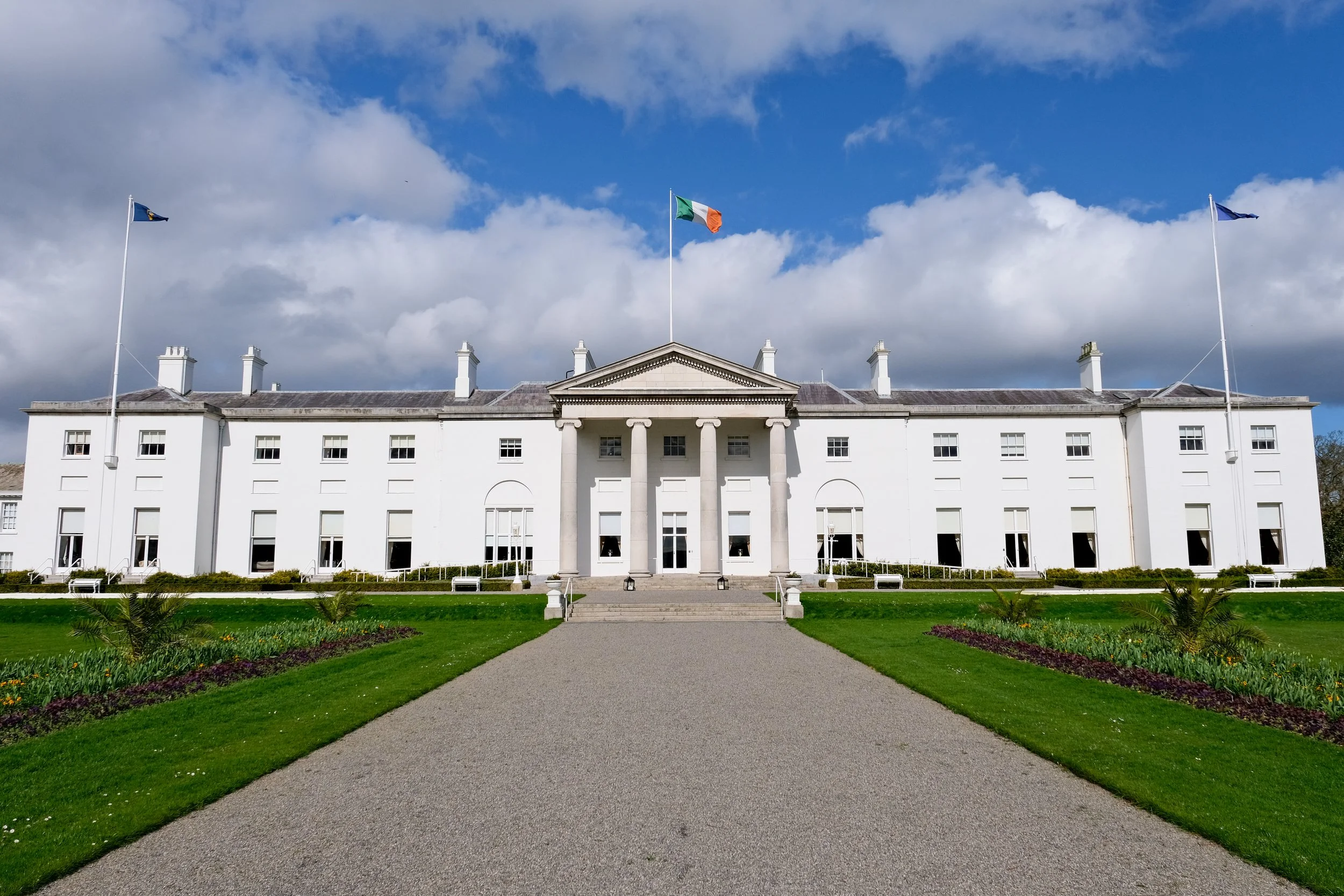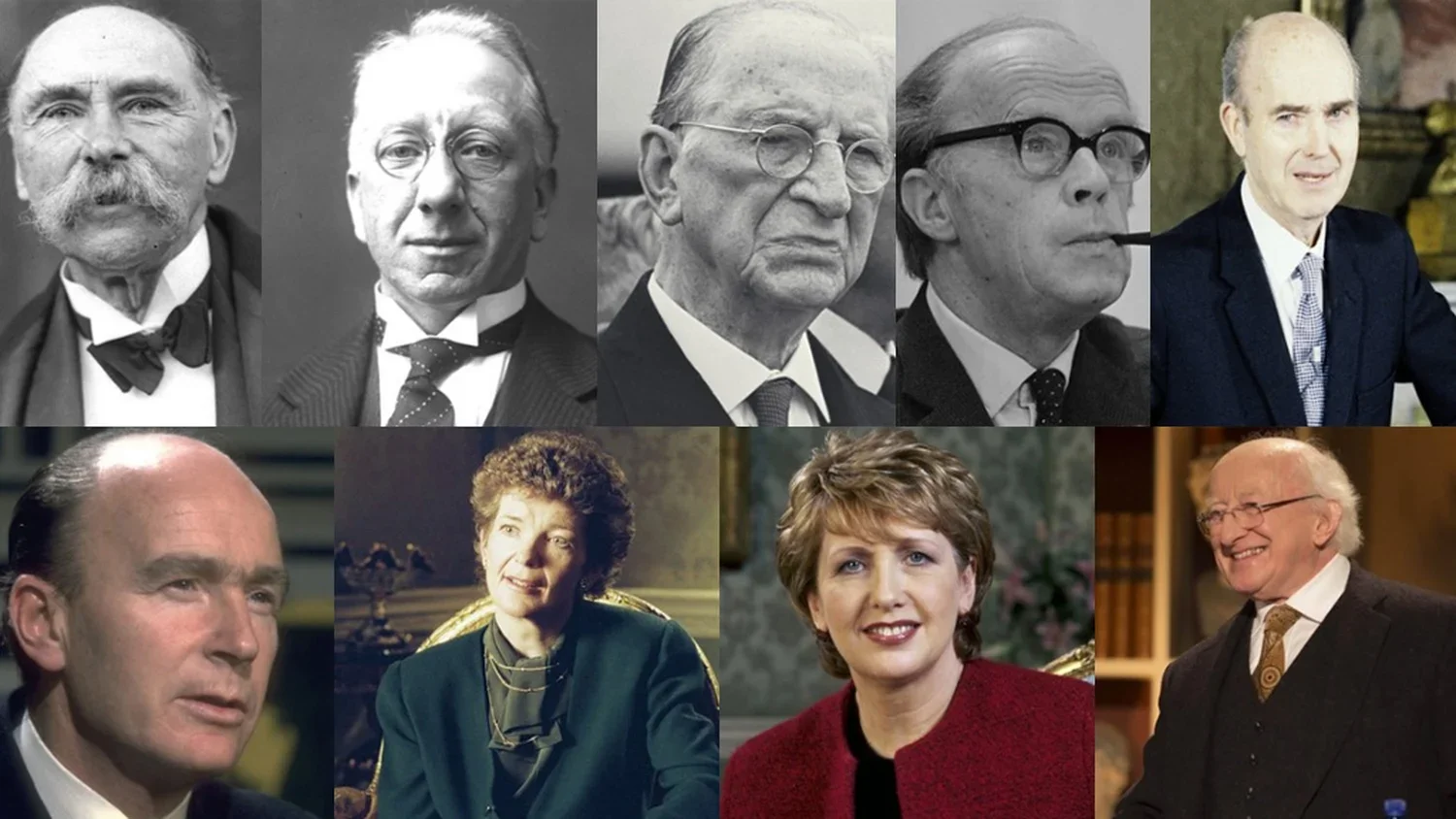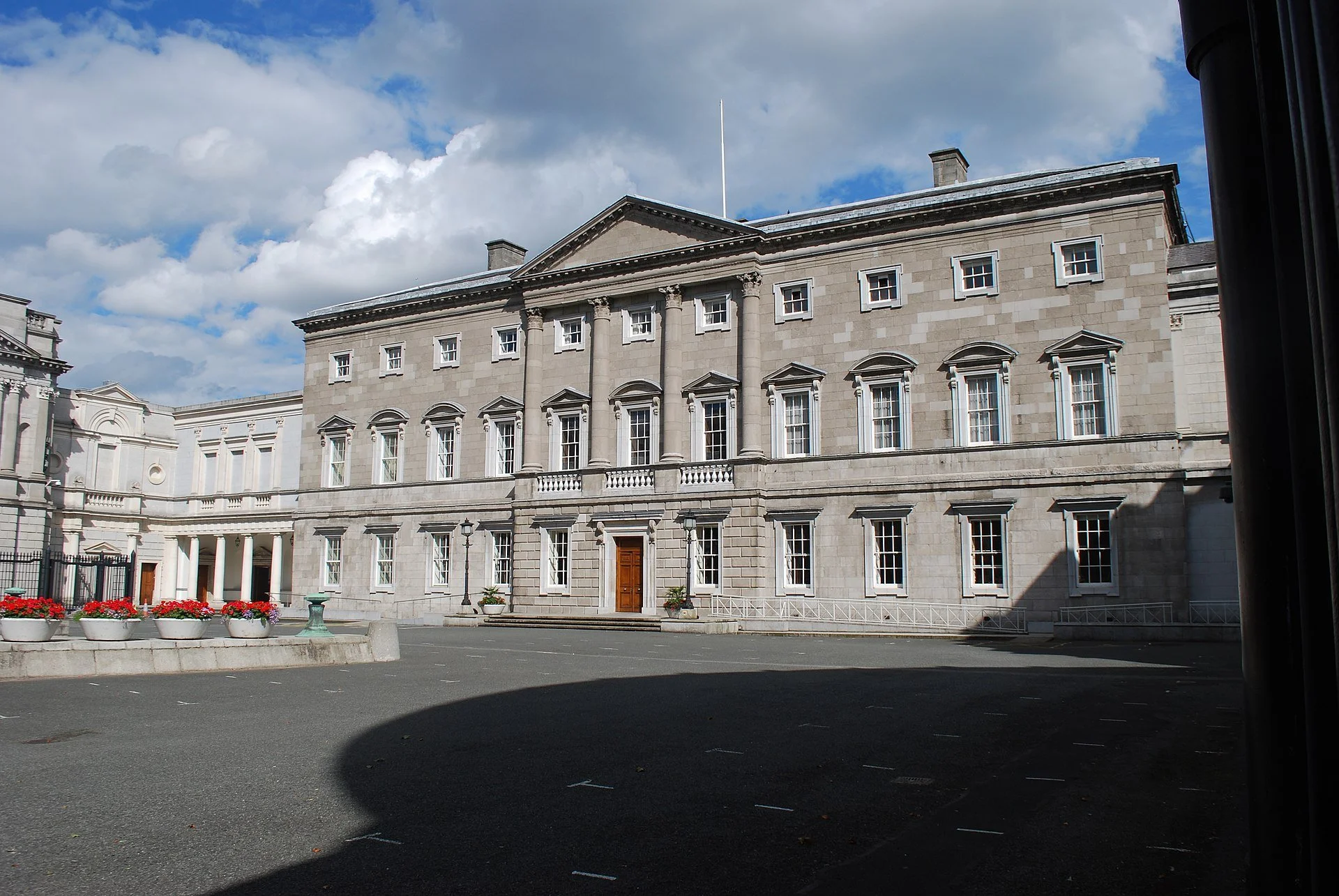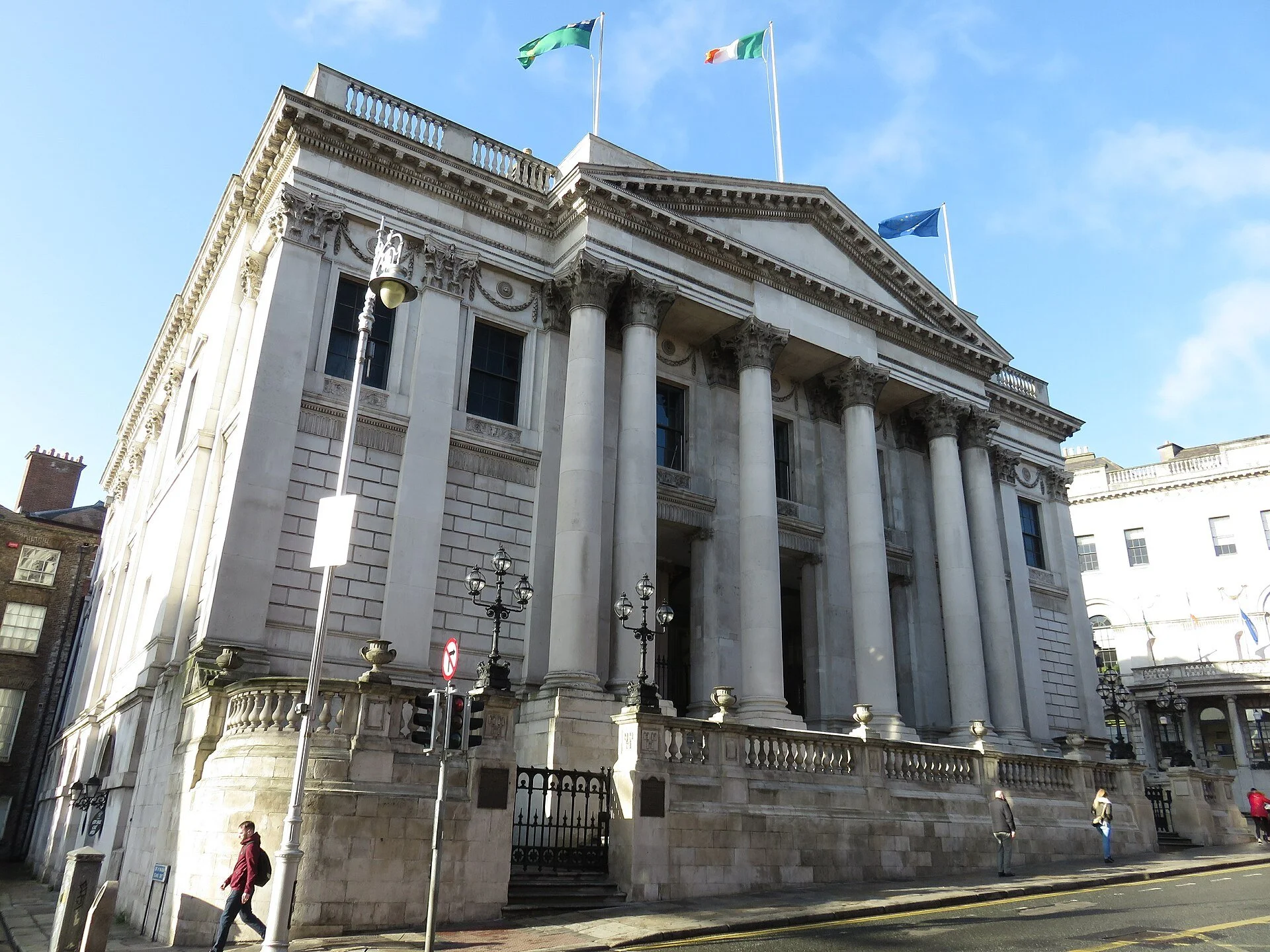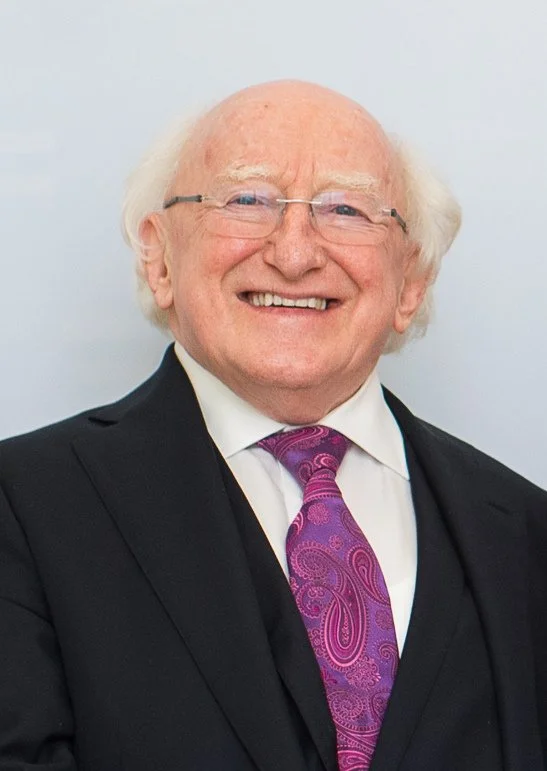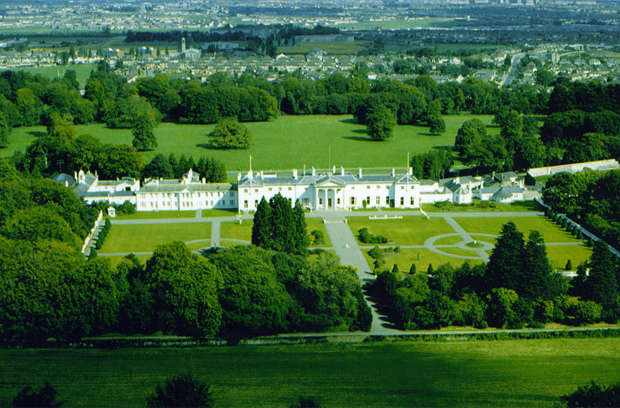Everything you need to know to become the next president of ireland
Bunreacht na hÉireann (the Constitution of Ireland) describes the President (Uachtarán) as taking “precedence over all other Persons in the state,” which, as far as official importance goes, is just about as high as you can get on this island. If that sounds like the perfect job for you, then you’re in the right place. Here’s (almost) everything you’ll need to know to become the head of state of Ireland’s great republic.
But at what cost?
Let’s not get ahead of ourselves - being the President isn’t… hard, is it? What are the duties? What are the perks?
Áras an Uachtaráin. Source: Heritage Ireland
Free Gaff: The most famous benefit of the office is the Arás an Uachtaráin (Residence of the President), a gorgeous, 92-room, historic lodge in the heart of the Phoenix Park built in the 1750s. The rent is cheap as chips (in a world where chips were free), pets are not only allowed but encouraged, it comes with 30 staff based on-site, and don’t even start on the location, which, for Dublin, has been home to relatively few murders. If the Office of Public Works (OPW) is to be believed, it was valued at a mere €750,000 in 2013, but given the rapidly increasing cost of housing over the last decade - and the fact that 750k would only get you a 3-bedroom in Blackrock on Daft.ie today, its true value is likely much, much, much higher.
Six Figures: The salary is far from shabby, ranging somewhere between €249,000 and €350,000 per annum, but if you’re in it for the money, your better bet is becoming a CEO. The variability is the consequence of the 2008 financial crash. In the wake of the recession, as public sector workers across the country were having their wages reduced, then-President Mary McAleese, and later Michael D Higgins, voluntarily took pay cuts in the neighbourhood of €65-75,000 due to a legal constraint imposed by the constitution: the “emoluments and allowances” of the sitting President can not be reduced during their term. As a result, the exact figure you’ll be taking home if you get the job isn’t entirely clear. If you dream bigger than six figures, don’t fret - the total budget for the Office of the President was €3.9 million in 2017, which means, if you’re a fan of garden parties, you’re in for a treat.
Free Travel: As Uachtarán, don’t even dream of opening up Skyscanner. Travel expenses during your term of office will be completely covered by the state, putting any so-called welfare cheats to shame. The only problem, of course, is that the Constitution says that you won’t be allowed to leave the state without the permission of the government, so stay on Micheál Martin’s good side when booking the hollibops.
Supreme Power: The Office of the President, unlike most public bodies in Ireland, is exempt from freedom of information requests, meaning no sneaky student journalists will get access to your secret emails where you agree to pardon your cousin who was caught speeding in a school zone. If you were elected, you’d also serve as Supreme Commander of Ireland’s Defence Forces, and while, in practice, it’s not really your decision whether the country goes to war, and the status quo is that the Minister for Defence would run the whole operation on your behalf, if you were feeling feisty, you could probably get up to some mischief in that regard.
Limited Responsibility, In Practice: As far as responsibilities of heads of states go, Uachtarán na hÉireann has it pretty lax compared to our friends across the Atlantic, leaving the running of the country to the Taoiseach (chieftain/leader/prime minister), the head of Ireland’s government. However, as much as laws are the law, as President, you are the law: any bills passed in the country are only in effect once you “promulgate” (sign) them, though you wouldn’t actually be allowed to veto any that you disagree with. The same is true of the formal appointments of the Taoiseach and government ministers as well as convening Dáil Éireann (Assembly of Ireland, the state’s chief legislative body) - the President’s involvement is mostly ceremonial. If you feel like paying attention, though, you do have the power to refer laws that you think are unconstitutional to the Supreme Court for review.
Representing The Country: On matters of national or public importance, the President may address the country. The first televised broadcast from the RTÉ in 1961, for example, began with an address from Éamon de Valera, former revolutionary and Taoiseach, who was, by this point, head of state. The content of such addresses must, however, be approved by the government - though in recent months Michael D Higgins has been particularly explicit about his condemnation of Israel’s genocide of the Palestinian people in sharp contrast to more restrained language used by the Taoiseach. Despite all these caveats, the President remains the figurehead of the nation, representing Ireland to foreign heads of state and governments abroad or on official visits.
If all of that failed to dissuade you, you might just have what it takes to be Ireland’s next Supreme Commander.
entering the race…
Previous Irish Presidents. Source: RTÉ Archives.
To get your name on the ballot paper, you’ll have to be nominated in one of two ways, and, unfortunately for the majority of our readers, be at least 35 years of age. 1st years need not apply.
route 1: the oireachtaS
Leinster House. Source: Jean Housen
The first and, in purely numerical terms, easiest route to nomination is having your form signed by members of the Houses of the Oireachtas (Parliament). In this context, houses refers to legislative assemblies (who debate and vote on proposed laws), of which Ireland has 2. The Taoiseach and their deputy, the Tánaiste, as well as the ministers of their government, are all picked from the much more famous and powerful lower house of the Dáil, but that doesn’t mean its little brother, the upper house of the Seanad (Senate), has nothing to say for itself.
Dáil Éireann is where the majority of your potential targets sit, with 174 members representing Ireland’s 43 constituencies known as TDs (Teachta Dálaí, or Dáil Deputies). If you voted in the 2024 General Election, you might have even helped get one of these members their seat, so that’s a good place to start.
Seanad Éireann is home to the other 60 members of the Houses of the Oireachtas, only 6 of whom are directly elected (and so far only by graduates from certain universities), and none of whom may vote to completely veto any bills approved by the Dáil, though they can debate, delay, and even propose their own bills. The Seanad, in its limited legislative functions, has survived more than one attempt at abolition, so while it’s still around, it’s a good idea to get at least a couple of signatures from Senators to make them feel important.
Across the Houses of the Oireachtas, you need approximately 8.5% of its lawmakers, just 20 in total, to sign your nomination form. While this might sound fairly reasonable, and even on paper quite achievable, the practical reality is a little more complicated, and becomes more so the closer we get to the election.
Your biggest obstacle is party politics. Between both houses, only 28 deputies and senators were elected as independents. If you managed to get all 28 to support you, you’d exceed the nomination quota, but in practice, this is basically impossible. These independents come from all sides of the political spectrum, and nobody can be everything for everyone, least of all a candidate for President. Getting the official nomination of one or more of the political parties is also far from easy, putting you up against presidential hopefuls with deep roots in the parties themselves.
Fine Gael’s nomination, for example, has been serving under their party banner since 2003, gaining the party’s pick following an internal ballot of Oireachtas members. A number of weeks later, she was ratified as the official candidate at a party event a number of weeks later. This process, more or less, was mirrored across nearly every other political party that has decided to support a candidate, which, at the time of writing, constitutes 199 deputies and senators in their ranks, 85% of your potential nominators. Those who remain are mostly independents, none of whom represent parties with enough of a mandate to get you on the ballot alone.
While individual members of the houses can only sign the nomination of one candidate, with so many more party-aligned members than required signatures, you could, in theory, still be nominated by individuals who might not agree with the party pick or, for the sake of democracy or whatever, support your ability to enter the race. In practice, however, this is even less likely than you might expect: Willie Willie O’Dea, a Fianna Fáil TD for Limerick, for example, considered giving Aontú and Independent Ireland-backed Maria Steen a nomination, but the fact that his party had already selected a candidate meant that signing her form would be “breaking ranks.” Without support from others from his party, this could risk him losing the party “whip” and being forced to serve as an independent, which, after 43 years serving under the party banner in the Dáil, surely doesn’t sound appealing. This metaphorical “whip” exists, in general practice, to ensure that politicians vote in line with party policy, or in this case, nominate only the candidate that their party is supporting. The reality is, of course, that whether or not someone is up against the whip, if the party they were elected alongside has democratically chosen to stand behind a particular candidate, chances are they don’t disagree, or at the very least are unlikely to do so publicly.
So, like Maria Steen, who failed to reach the quota with just 18 nominations, you’re likely shit out of luck when it comes to getting on the ballot through the Oireachtas route.
route 2: thE COUNCILS
Dublin City Hall. Source: Antony-22.
Your only other real option is to gain the support of the four county councils from throughout the island. Of the 31 local authorities in the county, a slightly higher requirement of 12.5% of the total is needed, but unlike in the Oireachtas, where nominations are signed by individual politicians, the majority of the councillors in each authority must vote in favour of you to become their single nomination. While local politics is less partisan than that which takes place in Leinster House, it’s hard to imagine an Aontú councillor supporting the bid of a Socialist Party candidate, for example.
As presidential wannabes like convicted rapist Conor McGregor, former Riverdance performer Michael Flatley, pharmaceutical company founder Gareth Sheridan, former Lord Mayor of Cork Keiran McCarthy, aforementioned abortion-hater Maria Steen, and objectively too many others sought nomination through the council route, they found themselves running into the reality of local politics, which, like national politics, is politics.
Fianna Fáil, even with their own candidate selected, and Sinn Féin, who didn’t announce theirs until much later, both allowed a free vote for their councillors if their authority was to vote on whether to nominate a candidate. Fine Gael, however, instructed their 249 councillors, a whopping 26% of the total across the island, to vote against anyone who tried to gain council support.
In this election, just 3 councils ended up nominating a candidate, with 2 and 1 for Gareth Sheridan and Kieran McCarthy respectively. This means, which you might have picked up on if you’re familiar with numbers, that no candidate met the required quota of 4. The last election in which no candidate made it onto the ballot through the council route - the uncontested 2004 re-election of Mary McAleese aside - was 1990. The following election, 1997, was the first in which a candidate had gained nomination through the council route since the constitution of the republic was adopted by the nation in 1937. The proceeding 3 contested elections each had at least one such candidate on the ballot, with a whopping 4 of 6 being nominated through the council route, though none have ever managed to gain victory.
route 3: Self-nomination
President Michael D. Higgins. Source: Bundesministerium für europäische und internationale Angelegenheiten
There is a very special third way to get on the ballot, but unless you are from an alternate timeline wherein you won the 2018 presidential election and have been our president since then - in which case, it’s an honour - it doesn’t apply to you. The current serving president, having served only a single term, may nominate themselves for re-election, just as Michael D Higgins, Ireland’s current President, did 7 years ago. Given he’s served the maximum of 2 terms, this was not an option for him in this election, even if he wasn’t 84 years old, which, unfortunately for those familiar with statistics around life expectancy, he is.
putting it into practice
The Phoenix Park. Source: Department of Environment, Heritage and Local Government
The most damning concern for your would-be campaign, of course, is that nominations closed on September 24th, leaving you at least a week too late.
You aren’t alone in missing the deadline with too few - or zero - nominations despite lofty ambitions. Perhaps you could reach out to your fellow losers and make a group chat to ease the pain of nationwide rejection, or, perhaps, like Independent Ireland, you can call for a referendum to change the laws that stood in the way of you making it to the ballot - in the name of democracy, of course. There’s also the option of by-election - if, for whatever reason, the office of the President is vacated either through impeachment by the Oireachtas or permanent incapacitation, a successor must be elected within 60 days. However, given the constitutional articles that outline these processes have never been invoked, and that the President receives the highest level of protection of any individual in the state, neither seem like winning strategies.
Presidential elections take place every 7 years, so if you’re still interested, bookmark this page and check back in 2032. The 2025 Presidential Election takes place on October 24th, and, while you’d obviously do a better job, you have until October 7th to register to vote for who the next Uachtarán na hÉireann will be.
